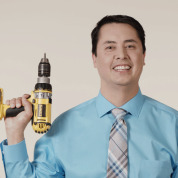Phonak Faces of Audiology: Five minutes with Paul Kreimer, Clinical Training Manager at Phonak US
AudiologyOnline: Paul, you have been a clinical trainer with Phonak for ten years now. What does your typical work day look like?

Paul Kreimer, MA: Most people immediately think of large regional presentations when I tell them that I work as a clinical trainer, however, this is only a small part of my work. Most of my time is spent in clinics teaching hearing care professionals about a product, how it works and how to use it or supporting them with a patient who has a difficult challenge. There's actually a much heavier clinical side to my role than most people would expect. This is the part I love most about my job: working with the hearing care professionals to help their patients hear to their fullest potential. A typical day could include a patient fitting assist in the morning, a lunch time product training followed by a talk with a group of students at a university. An after-hours dinner training could also be part of my day. The one thing about this career is that it is never boring.
AudiologyOnline: You visit numerous hearing care professionals every month. Do you remember an especially funny situation or very special moment that you would like to share with us?
Paul Kreimer, MA: By the time I am called in to help with a patient, the hearing care professional has already tried everything they could to address their patient’s problem. I am asked to come in with a fresh set of eyes to look at the problem from a different angle. Many times, this means being creative and thinking outside of the box. Especially now that hearing aids are fully connected, the level of complexity of patient challenges has definitely increased. Recently, I was asked to help program an autistic child’s hearing aids to help him hear better at a school with limited support for hearing impaired children. After talking with him and his mother, I demoed a Roger Pen system and we discussed how it could benefit him not only at school, but also at home. I heard from the clinician two weeks after the family obtained their own pen. She said that the mother reported the child was not only hearing better at home and school, he was also interacting with classmates and family more confidently and genuinely excited about his hearing aids. Moments like this are still special to me after all those years. I have always enjoyed helping people, and seeing that you can make a difference in another person’s life is very rewarding.
AudiologyOnline: Through the Phonak Faces of Audiology initiative, we have learned that you are a tech nerd and that you love to fix things. Can you tell us what this had to do with you opting for a career in audiology?

Paul Kreimer, MA: I started in college with the idea that I wanted to be an engineer. Midway through my second semester, I realized that engineering just wasn't for me. I felt that it was too cold and too impersonal, and I missed a human connection aspect in it. I wanted a career where I could really interact with people on a more personal level. I transferred to the speech and hearing program, expecting to become a speech pathologist. In one class, we had a guest speaker who was the Audiology Director at the leading children’s hospital in our region. His talk really inspired me to become an audiologist. I have never regretted this decision because to me, audiology is the perfect marriage of technology and human interaction.
AudiologyOnline: Phonak has recently launched Marvel, promising love at first sound. Do your experiences working with customers and their clients confirm this?”
Paul Kreimer, MA: My experiences so far working with Marvel have far exceeded my expectations. I knew on paper that this product was going to be a game changer, however, the reactions and feedback from providers and patients have been truly moving. The number one response I continually hear from patients is that the sound quality is incredible and so much better than anything they have heard before. Additionally, my wife is a practicing clinical audiologist and has never shied away from giving me her honest opinion about any of our products. Knowing that Marvel has her ringing endorsement is proof enough for me.
AudiologyOnline: Based on your experience from both the manufacturer side and from working with so many hearing care professionals throughout the US, where are we heading with our industry?
Paul Kreimer, MA: If I look back at my 20 years in the profession and the amount of change that has happened during this time, I think this is something that sets our industry apart from other industries. There have been multiple times that the end of our profession has been predicted, but audiology has always been able to reinvent itself. In a time where digital solutions are becoming more and more of a reality in our industry, a lot of hearing care professionals fear that the personal connection is going to disappear. I am convinced that this is not going to happen. People will always want and need that personal connection. If we use modern technologies in the right way, this will give clinicians more time help educate patients, help them have more realistic expectations, and to work with their patients to help them hear to their fullest potential.
AudiologyOnline: Having worked as a clinician yourself for several years and now being a clinical trainer, which tips would you like to pass on to young professionals in our industry?

Paul Kreimer, MA: I do have a tip that I always share when talking with young clinicians. The tip is to always ask more questions. While supervising students in clinic, it was not uncommon for a young clinician to ask a patient for their experiences with a hearing aid to immediately begin to make adjustments to the hearing aid or counsel based on that one response. I would always show how asking 2, 3, even 4 more questions regarding that answer can lead them as a clinician to a different decision. For example, if a patient says their hearing aid is too loud, it’s easy to just reduce the gain for them. However, additional questions might uncover that the hearing aid is only too loud in a particular situation, or only with a particular person they meet with occasionally, or only at the wedding reception they recently attended. This knowledge would guide a clinician down a very different clinical path. So, my tip is, always ask more questions.
Find out more about Paul, what drives him and his passions by clicking here.
Life has many facets – so does audiology. Discover the people behind Audiology at Phonak US in Warrenville, IL by clicking here or the Phonak Partner Page on AudiologyOnline.


